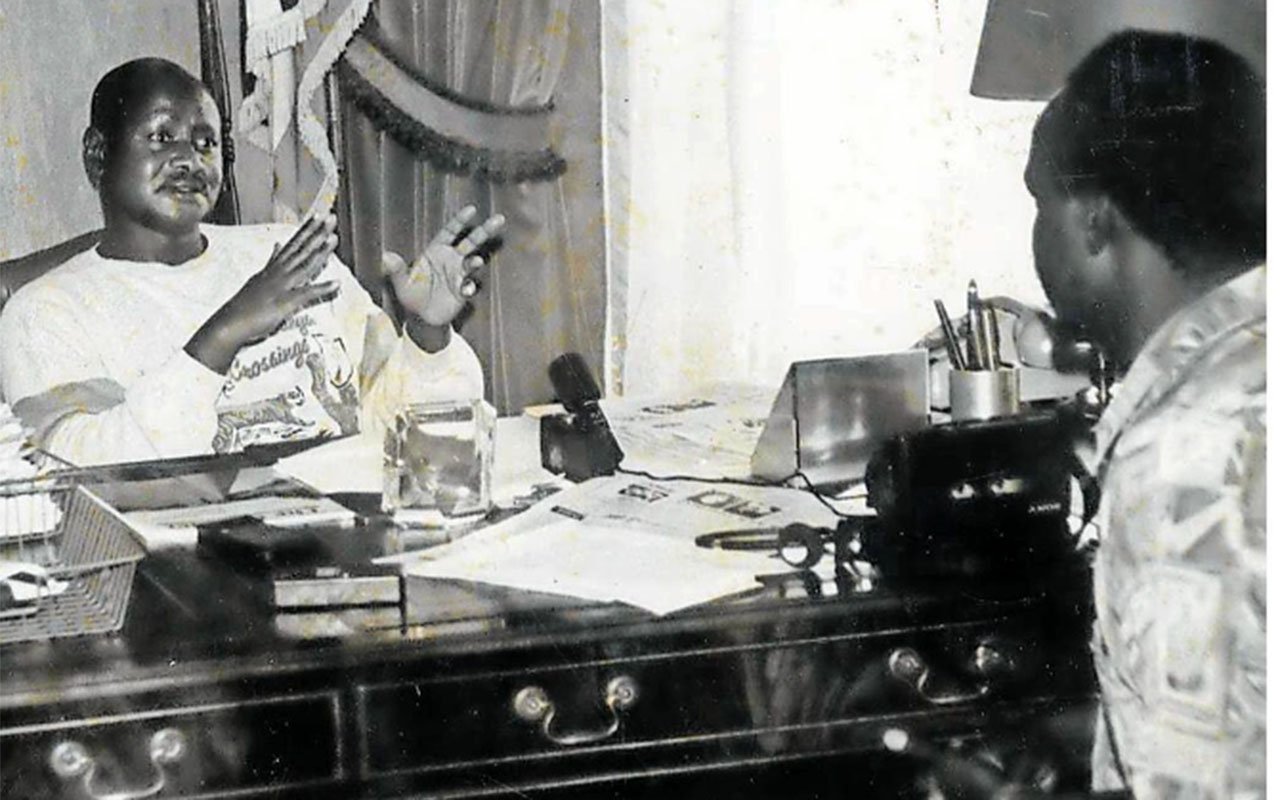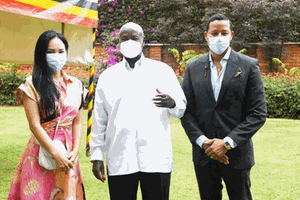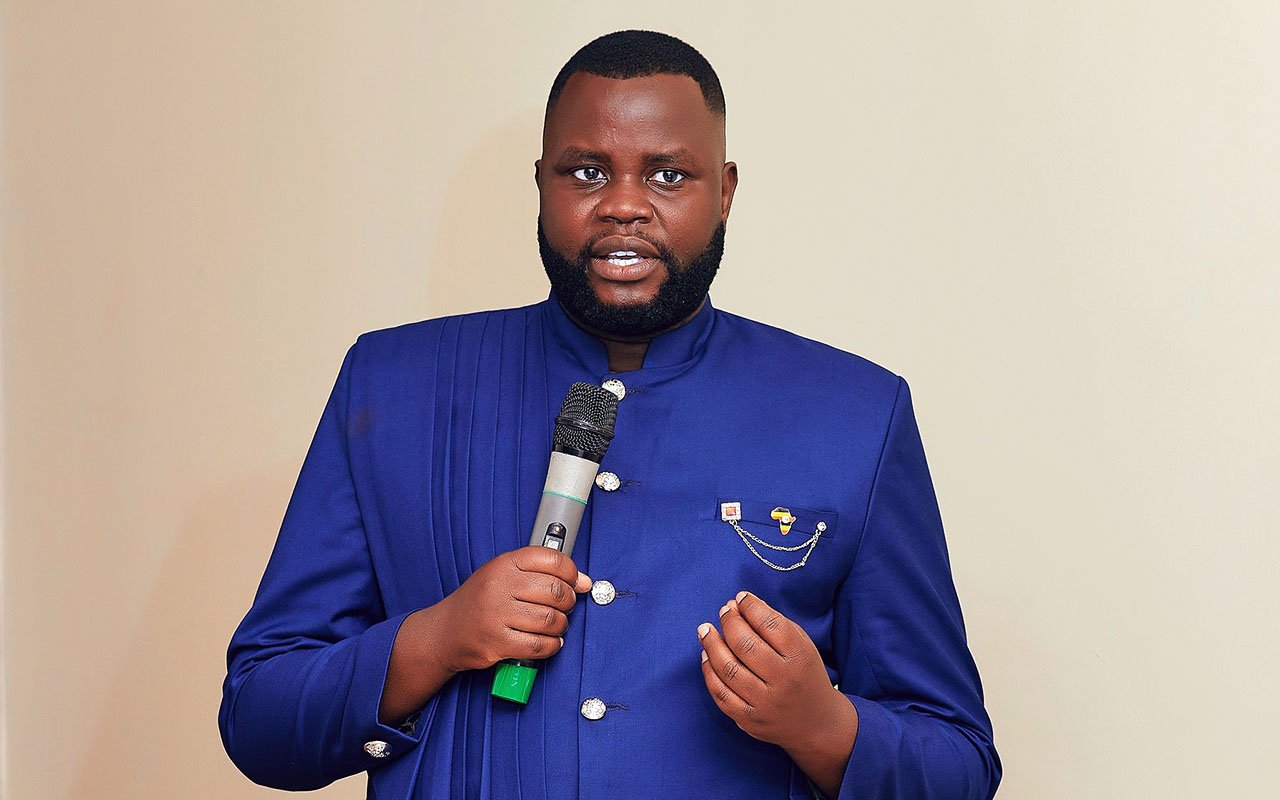
President Museveni (left) is interviewed by The Monitor editor, Wafula Oguttu at Entebbe State House in the 1990s. PHOTO/FILE
Twenty eight years ago earlier this month, it emerged that an American national masquerading as an oil investor had fooled several government officials, including President Museveni, and in so doing made off with about Shs190 million.
The Monitor’s edition of November 8, 1996, reported that the American, Jerry J Ward, first came to Uganda in 1993 shortly after he had held meetings with Uganda’s ambassador to the United States, Stephen Katenta Apuuli.
The conman was consequently introduced to the President with whom he held several meetings before meeting other government officials including, Dr Samson Kisekka, who was the vice president at the time.
The discussions, according to the newspaper, centred on the possibility of investment in oil exploration and food processing.
Ward is then said to have formed a private limited liability company, Uganda General Works and Engineering (UGWEC Ltd), which was registered on February 28, 1994.
He was subsequently issued with a licence to engage in food processing and cold storage. The licence expired at the end of October 1996 without him having put anything on the ground.
Agreement
In a much-publicised and hyped event, on February 21, 1995, UGWEC and the Ministry of Natural Resources signed a petroleum exploration and production sharing agreement (PSA) that was meant to pave the way for the exploration of oil in the Lake Albert region.
Under the terms of the agreement, Ward was to sink in an initial $10 million, which he never did yet according to the provisions of the agreement, work was meant to have commenced within 90 days of the initiation of the agreement.
Fake bank guarantee
Concerned that the American was not meeting his end of the agreement, the government brought pressure to bear on Ward who produced a $10 million bank guarantee, which according to the newspaper, turned out to be fake.
While his boss was taking government officials for a ride, Mr Ward’s aide in UGWEC, Lawrence Denig, started moving around Kampala selling shares in UGWEC to prominent members of the business community in Kampala.
The Monitor learnt back then that a total of 41 Ugandan individuals and organisations, charmed into cashing in on the petro-dollars, parted with $102,916 (Shs103 million). Another set of Ugandans based in the US were also charmed into coming up with another $85,217 (Shs85 million).
However, following the discovery that the bank guarantee he had issued was fake and that he had no capital to finance the investments, in March 1996, government officials who were now left with egg on their faces cancelled the UGWEC licence.
Ugandan members on the board of UGWEC also resigned. The group included the alternate chairman of the board, Apuuli, the secretary, Mr Emmanuel Kirenga, and businessmen Thomas I Katto and Boney M Katatumba. Mr Kirenga was the minister of State for Justice and Constitutional Affairs.
Ward denounced
The members of the board were quick to condemn Ward as a fraudster who never paid them for their services.
“He is a thief. I resigned in May this year,” Mr Kirenga was quoted to have told the newspaper.
“I resigned. They never paid. They gave a false cheque and ran away. We even closed their offices,” said Katatumba.
UGWEC had taken up office space on Blacklines House which Mr Katatumba owned. The firm had also taken out accommodation for both Ward and Denig at Hotel Diplomat, another of the tycoon’s properties. The two entities were owed a total of $74,000.
“Ward presented himself to us as a rich leading civil engineer on America’s West Coast with assets worth $120m. We stupidly believed him,” Katenta Apuuli was quoted to have lamented.
New agreements
It should be noted that it was during the same time that the government entered into negotiations with three other firms, TDC Energy and Azania House from the US, and Heritage Oil and Gas of Britain, to explore for oil.
Interestingly though, Ward was one of the first people to urge the government to tread carefully while dealing with the three firms. He, in an October 24, 1996, letter that he faxed to the Office of the President, the American embassy, the Ministry of Energy, MPs and the press, called for caution on the new deals that the government was working on.
“I sincerely hope you carefully review both (Heritage Oil) oil proposals...before any petroleum contract is approved by the government,” he wrote.
Hunt
In what turned out to be a case of throwing good money after bad, the government hired the services of an international firm, the Washington DC-based law firm Ms Reichler, Milton and Mqdel, to bring Ward to book. The lawyers visited Uganda between May and June 1996.
“It is true Uganda’s lawyers are looking into the matter,” Mr Kirenga told The Monitor back then.
The hunt never amounted to much.







